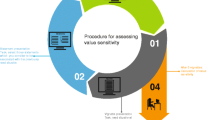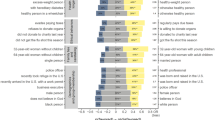Abstract
When ethical decisions have to be taken in critical, complex medical situations, they often involve decisions that set the course for or against life-sustaining treatments. Therefore the decisions have far-reaching consequences for the patients, their relatives, and often for the clinical staff. Although the rich psychology literature provides evidence that reasoning may be affected by undesired influences that may undermine the quality of the decision outcome, not much attention has been given to this phenomenon in health care or ethics consultation. In this paper, we aim to contribute to the sensitization of the problem of systematic reasoning biases by showing how exemplary individual and group biases can affect the quality of decision-making on an individual and group level. We are addressing clinical ethicists as well as clinicians who guide complex decision-making processes of ethical significance. Knowledge regarding exemplary group psychological biases (e.g. conformity bias), and individual biases (e.g. stereotypes), will be taken from the disciplines of social psychology and cognitive decision science and considered in the field of ethical decision-making. Finally we discuss the influence of intuitive versus analytical (systematical) reasoning on the validity of ethical decision-making.
Similar content being viewed by others
Notes
Binge eating disorder is characterized by compulsive overeating in which people consume huge amounts of food while feeling out of control and powerless to stop.
Balancing of interest’ is a method developed in the discipline of ethics. It describes the process of practical reasoning needed for a qualified solution to a choice or decision conflict. Such conflicts arise because a specific decision may be beneficial for one person or group, but detrimental for another person or group. In such cases, the expected benefits and burdens must be weighed as carefully as possible, while taking into account individual and collective needs in addition to their urgency; the rights of the individual; precedence of public welfare, and questions of justice.
References
Aberegg, S.K., E.F. Haponik, and P.B. Terry. 2005. Omission bias and decision making in pulmonary and critical care medicine. Chest American College of Chest Physicians 128: 1497–1505.
Agich, G. 2001. The question of method in ethics consultation. The American Journal of Bioethics 1(4): 31–41.
Albisser Schleger, H., and S. Reiter-Theil. 2007. ‘Age’ and ‘Costs’—Factors in treatment decisions at the end-of life? An analysis of informal knowledge structures of doctors and nurses. Ethik in der Medizin 19: 103–119.
Albisser Schleger, H., H. Pargger, and S. Reiter-Theil. 2008. ‘Futility’—Overtreatment at the end of life? Reasons for missed cessations of therapy in geriatric and critical care. Zeitschrift für Palliativmedizin 9: 67–75.
American Society for Bioethics and Humanities (ASBH). 1998. Core competences for health care ethics consultation. Reprinted 2003 Glenview, IL, USA. In Ethics consultation. From theory to practice, ed. M.P. Aulisio, R.M. Arnold, and S.J. Youngner, 165–209. Baltimore and London: The John Hopkins Press.
Anderson, C.J. 2003. The psychology of doing nothing—Forms of decision avoidance result from reason and emotion. Psychological Bulletin 129: 9–167.
Asch, S.E. 1956. Studies of independence and conformity—A minority of one against an unanimous majority. Psychological Monographs 70(9): 416.
Asch, D.A. 2001. Economics and decision science. In Methods in medical ethics, ed. J. Sugarman, and D.P. Sulmasy, 227–234. Washington DC: Georgetown University Press.
Beck, S., A. van de Loo, and S. Reiter-Theil. 2008. A ‘little bit illegal’? Withholding and withdrawing of mechanical ventilation in the eyes of German intensive care physicians. Medicine, Health Care and Philosophy 11: 7–16.
Beecher, H.K. 1955. The powerful placebo. The Journal of the American Medicine Association 159: 1602–1606.
Bernal, E.W. 2000. Errors in ethics consultation. In Margin of error: The ethics of mistakes in the practice of medicine, ed. S.B. Rubin, and L. Zoloth, 255–272. Hagerstown, Maryland: University Publishing Group.
Bierhoff, H. 2006. Sozialpsychologie—Ein Lehrbuch. Stuttgart: W. Kohlhammer.
Brody, H. 1997. The doctor as therapeutic agent: A placebo research agenda. In The placebo effect—An interdisciplinary exploration, ed. E. Harrington, 77–92. Cambridge: Harvard University Press.
Campbell, J.D., and P.J. Fairey. 1989. Informational and normative routes to conformity—The effect of faction size as a function on norm extremity and attention to the stimulus. Journal of Personality and Social Psychology 57: 457–468.
Croskerry, P. 2005. The theory and practice of clinical decision-making. The Canadian Journal of Anasthesia 52(6/pp): R1–R8.
Dörner, D. 1997. The logic of failure: Recognizing and avoiding error in complex situations. Cambridge, MA: Perseus Press.
Fletcher, J., R.J. Boyleand, and E.M. Spencer. 2000. Errors in Healthcare Ethics Consultation. In Margin of error: The ethics of mistakes in the practice of medicine, ed. S.B. Rubin, and L. Zoloth, 343–373. Hagerstown, Maryland: University Publishing Group.
Foerde, R., R. Pedersen, and V. Akre. 2008. Clinicians’ evaluation of clinical ethics consultations in Norway: A tool for quality improvement. Medicine, Health Care and Philosophy 11(1): 17–25.
Gerard, H.B., R.A. Wilhelmy, and E.S. Conolley. 1968. Conformity and group size. Journal of Personality and Social Psychology 8: 79–82.
Gigerenzer, G., P.M. Todd, and The ABC Group. 1999. Simple heuristics that make us smart. New York: Oxford University Press.
Gigone, D., and R. Hastie. 1993. The common knowledge effect: Information sharing and group judgment. Journal of Personality and Social Psychology 65: 959–974.
Gigone, D., and R. Hastie. 1996. The impact of information on group judgment: A model and computer simulation. In Understanding group behavior: Consensual action by small groups, Vol. 1, ed. E. Witte, and J.H. Davis, 221–251. Mahwah: Lawrence Erlbaum.
Habermas, J. 1995. Moral consciousness and communicative action. Cambridge, MA: The MIT Press.
Hertwig, R., and P.M. Todd. 2003. More is not always better—The benefits of cognitive limits. In Thinking—Psychological perspectives on reasoning, judgment and decision making, ed. D. Hardman, and L. Macchi, 213–231. Chichester, England: Wiley.
Hume, D. 1978. A treatise of human nature. Clarendon: Oxford University Press.
Hurst, S.A., R. Forde, S. Reiter-Theil, A.M. Slowther, A. Perrier, R. Pegoraro, and M. Danis. 2007. Physicians’ views on resource availability and equity in four European health care systems. BMC Health Services Research 7: 137.
Janis, I.L. 1982. Groupthink—Psychological studies of policy decisions and fiascoe, 2nd ed. Boston: Hougthon Mifflin.
Jungermann, H., H.R. Pfister, and K. Fischer. 2005. Die Psychologie der Entscheidung—Eine Einführung. Heidelberg: Spektrum.
Kelley, H.H. 1955. The two functions of reference groups. In Readings in social psychology, ed. G.E. Swanson, T.E. Newcomb, and E.L. Hartley, 410–414. New York: Henry Holt.
Kelly, J.R., and S.J. Karau. 1999. Group decision making—The effects of initial preferences and time pressure. Personality and Social Psychology Bulletin 25: 1342–1354.
Kohlberg, L., C. Levine, and A. Hewer. 1983. Moral stages: A current formulation and a response to critics. Basel: Karger.
Larson, J.R.J., C. Christensen, T.M. Franz, and A.S. Abbott. 1998. Diagnosing groups—The pooling, management, and impact of shared and unshared case information in team-based medical decision making. Journal of Personality and Social Psychology 75: 93–108.
Lerner, M.J. 1980. The belief in a just world—A fundamental delusion. New York: Plenum.
Milgram, S. 1974. Obedience to authority–An experimental view. New York: Harper & Row.
Milgram, S. 1976. Obedience to criminal orders—The compulsion to do evil. In Contemporary social psychology—Representative readings, ed. T. Blass, 175–184. Itasca: Peacock.
Molewijk, B., M. Verkerk, H. Milius, and G. Widdershoven. 2008. Implementing moral case deliberation in a psychiatric hospital: Process and outcome. Medicine, Health Care and Philosophy 11(1): 43–56.
Moore, G.E. 1959. Principia ethica. Cambridge: Cambridge University Press.
Nunner-Winkler, G. 1984. Two Moralities? A Critical Discussion of an Ethic of Care and Responsibility versus an Ethic of Rights and Justice. In Morality, moral behavior, and moral development, ed. W.M. Kurtines, and J.L. Gewirtz. New York: Wiley.
Parks, C.D., and R.A. Cowlin. 1996. Acceptance of uncommon information into group discussion when that information is or is not demonstrable. Organizational Behavior and Human Decision Processes 66(3): 307–315.
Pfaefflin, M., K. Kobert, and S. Reiter-Theil. 2009. Evaluating clinical ethics consultation. Cambridge Quarterly Healthcare Ethics 18(4): 406–419.
Rawls, J. 1971. A theory of justice. Cambridge, MA: Belknap Press of Harvard University Press.
Redelmeier, D.A., L.E. Ferris, J.V. Tu, J.E. Hux, and M.J. Schull. 2001. Problems for clinical judgement—Introducing cognitive psychology as one more basic science. Journal of Applied Mathematics and Computing 164(3): 358–360.
Reitemeier, P.J. 2000. Quality and error in bioethics consultation: A puzzle in pieces. In Margin of error: The ethics of mistakes in the practice of medicine, ed. S.B. Rubin, and L. Zoloth, 231–253. Hagerstown, Maryland: University Publishing Group.
Reiter-Theil, S. 2001. Ethics consultation in Germany: The present situation. HEC-Forum 13(3): 265–280.
Reiter-Theil, S. 2003. Balancing the Perspectives. The patient’s role in clinical ethics consultation. Medicine, Health Care and Philosophy 6: 247–254.
Reiter-Theil, S. 2009. Dealing with the normative dimension in clinical ethics consultation. Cambridge Quarterly Healthcare Ethics 18(4): 347–359.
Reiter-Theil, S., M. Mertz, and B. Meyer-Zehnder. 2007. The complex Role of Relatives in end-of-life decision-making: An ethical analysis. HEC-Forum 19(4): 341–364.
Richter, G. 2007. Greater patient, family and surrogate involvement in clinical ethics consultation: The model of clinical ethics liaison as a measure for preventive ethics. HEC-Forum 19(4): 327–340.
Rosenberg, L.A. 1961. Group size, prior experience and conformity. Journal of Abnormal and Social Psychology 63: 436–437.
Rosenthal, R. 1966. Experimenter effects in behavioral research. New York: Appleton-Entury-Crofts.
Ross, J., S. Ross, and B. McClung. 2006. Ethical decision making and organizational behavior: A case of life and death. HEC Forum 18: 193–206.
Rubin, S.B., and L. Zoloth (eds.). 2000. Margin of error: The ethics of mistakes in the practice of medicine. Hagerstown, Maryland: University Publishing Group.
Saks, M.J. 1977. Jury verdicts—The role of group size and social decision rule. Lexington MA: Heath.
Saks, M.J., and M.W. Marti. 1997. A meta-analysis of the effects of jury size. Law and Human Behavior 21(5): 451–467.
Schulz-Hardt, S., F. Brodbeck, A. Mojzisch, R. Kerschreiter, and D. Frey. 2006. Group decision making in hidden profile situations—Dissent as a facilitator for decision quality. Journal of Personality and Social Psychology 6: 1080–1093.
Spranca, M., E. Minsk, and J. Baron. 1991. Omission and commission in judgment and choice. Journal of Experimental Social Psychology 27(1): 76–105.
Stasser, G. 2000. Information distribution, participation and group decision—Explorations with the DISCUSS and SPEAK models. In Computational modelling of behaviour in organizations, ed. D.R. Ilgen, and C.L. Hulin, 135–161. Washington, DC: American Psychological Association.
Stasser, G., and W. Titus. 1985. Pooling of unshared information in group decision making—Biased information sampling during discussion. Journal of Personality and Social Psychology 48: 1467–1478.
Sugarman, J., and D.P. Sulmasy (eds.). 2001. Methods in medical ethics. Washington D.C.: Georgetown University Press.
Sunstein, C.R. 2005. Moral heuristics. Behavioral and Brain Sciences 28(4): 531–573.
Thorndike, E.L. 1920. A constant error in psychological rating. Journal of Applied Psychology 4: 25–29.
Zikmund-Fisher, B.J., B. Sarr, A. Fagerlin, and P.A. Ubel. 2006. A matter of perspective—Choosing for others differs from choosing for yourself in making treatment decisions. Journal of General Internal Medicine 21(6): 618–622.
Acknowledgments
This paper is part of the project “Between Over-Treatment and Under-Treatment: Ethical Problems of Micro-Allocation”, no. 3200B0-113724/1, funded by the Swiss National Science Foundation. We are grateful for the helpful comments of Prof. Volker Dittmann, Legal and Forensic Medicine, University of Basel. We also thank Marcel Mertz, MA, for his helpful comments. Piera Jones, MA, and Nicola Stingelin Giles, MBA, MAS, MAE gave invaluable help in translating and editing the manuscript into native English. The paper has benefited much from the discussions in the PhD Colloquium, Dept. Medical and Health Ethics, Medical Faculty, University Hospital Basel.
Author information
Authors and Affiliations
Corresponding author
Rights and permissions
About this article
Cite this article
Albisser Schleger, H., Oehninger, N.R. & Reiter-Theil, S. Avoiding bias in medical ethical decision-making. Lessons to be learnt from psychology research. Med Health Care and Philos 14, 155–162 (2011). https://doi.org/10.1007/s11019-010-9263-2
Published:
Issue Date:
DOI: https://doi.org/10.1007/s11019-010-9263-2




